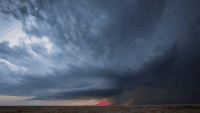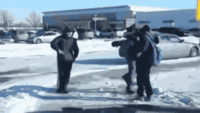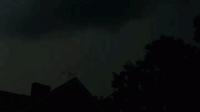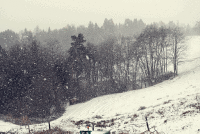
Let’s face it. Many of us have had some fear of weather at some point in our lives. As thunder rolls and lightning sparks the sky, some might find themselves in a state of panic. If the weather forecast calls for snow and ice, would you rush to buy bread and milk, then hunker down at home? This is so common that many local groceries stock up on extra bread, milk, eggs. And toilet paper every time the forecast calls for snowfall to occur. Yet, seldom are the roads ever bad for more than a couple of days even in the worst of winter storms. But there are exceptions such as ice storms when being prepared is critical. But there is a difference in being prepared and going into a panic. When a tropical storm or hurricane is barreling toward your community, there may be no choice but to seek shelter or leave the area entirely. And if you are afraid of weather events, your behaviors and choices during those times of emergency are often motivated by an instinctive process. “If you perceive something that you believe is threatening, whether or not it is or isn’t, you have a natural response to that perception,” said Dr. Michelle Newman, a clinical psychologist and professor of psychology and psychiatry at Penn State University. “Your body produces arousal – adrenaline – which is adaptive for humans in situations of ‘fight or flight.’ You will engage behaviors that will protect you and keep you safe.” Approximately one in 10 Americans may suffer from some degree of severe weather fear, according to the American Meteorological Society Journal. Here is a list of some of the top weather fears.
But there are exceptions such as ice storms when being prepared is critical. But there is a difference in being prepared and going into a panic. When a tropical storm or hurricane is barreling toward your community, there may be no choice but to seek shelter or leave the area entirely. And if you are afraid of weather events, your behaviors and choices during those times of emergency are often motivated by an instinctive process. “If you perceive something that you believe is threatening, whether or not it is or isn’t, you have a natural response to that perception,” said Dr. Michelle Newman, a clinical psychologist and professor of psychology and psychiatry at Penn State University. “Your body produces arousal – adrenaline – which is adaptive for humans in situations of ‘fight or flight.’ You will engage behaviors that will protect you and keep you safe.” Approximately one in 10 Americans may suffer from some degree of severe weather fear, according to the American Meteorological Society Journal. Here is a list of some of the top weather fears.
 Ancraophobia: Fear of wind Ancraophobia is not a commonly recognized fear but it can keep a person from living a normal life and may get worse as time passes. Those afraid of wind may avoid open windows. The outdoors or changing weather can be frightening to individuals who suffer from ancraophobia.
Ancraophobia: Fear of wind Ancraophobia is not a commonly recognized fear but it can keep a person from living a normal life and may get worse as time passes. Those afraid of wind may avoid open windows. The outdoors or changing weather can be frightening to individuals who suffer from ancraophobia.
 Antlophobia: Fear of floods The potential for flooding is often predicted ahead of time, which may give those in the floodplain a chance to move to higher ground. However, if you suffer from antlophobia, even a forecast of heavy rain may scare you enough to take shelter. Extreme cases of antlophobia sometimes result in the person moving to a dry region, such as a desert, where there is little chance of flooding.
Antlophobia: Fear of floods The potential for flooding is often predicted ahead of time, which may give those in the floodplain a chance to move to higher ground. However, if you suffer from antlophobia, even a forecast of heavy rain may scare you enough to take shelter. Extreme cases of antlophobia sometimes result in the person moving to a dry region, such as a desert, where there is little chance of flooding.
 Astraphobia: Fear of thunderstorms It might be frightening to see lightning, even if you are safe indoors. This treatable phobia can manifest in humans and animals. People with this fear may seek out reassurance from others or have a focused interest in weather forecasts. Dogs in particular may experience astraphobia and often need an involved and caring owner to deal with each passing storm.
Astraphobia: Fear of thunderstorms It might be frightening to see lightning, even if you are safe indoors. This treatable phobia can manifest in humans and animals. People with this fear may seek out reassurance from others or have a focused interest in weather forecasts. Dogs in particular may experience astraphobia and often need an involved and caring owner to deal with each passing storm.
 Chinophobia: Fear of snow People with this fear are often concerned they may become trapped in the snow and could choose not to drive as a result. Many times, this phobia is related to a traumatic experience involving snow from the past. Chionophobes also might refuse to go outside. But experts say it’s important to recognize snow as a natural occurrence that impacts people and animals all over the world.
Chinophobia: Fear of snow People with this fear are often concerned they may become trapped in the snow and could choose not to drive as a result. Many times, this phobia is related to a traumatic experience involving snow from the past. Chionophobes also might refuse to go outside. But experts say it’s important to recognize snow as a natural occurrence that impacts people and animals all over the world.
 Lilapsophobia: Fear of severe weather like tornadoes, hurricanes. Emotional distress associated with this recent weather event might lead a person to lilapsophobia and a range of anxiety-induced behaviors. Experts say those who fear severe weather can try to calm themselves by keeping tabs on the changing forecasts and having a plan when a serious weather event is headed their way.
Lilapsophobia: Fear of severe weather like tornadoes, hurricanes. Emotional distress associated with this recent weather event might lead a person to lilapsophobia and a range of anxiety-induced behaviors. Experts say those who fear severe weather can try to calm themselves by keeping tabs on the changing forecasts and having a plan when a serious weather event is headed their way.
These are just a few of the more common phobias associated with weather. According to a 2014 study published in the American Meteorological Society Journal, approximately one in 10 Americans may suffer from some degree of severe weather fear. Researchers from Ball State University and the University of Kansas said study participants reported feelings of anxiety and helplessness, increased heart pounding and the need to change their schedules when faced with a severe weather event.  The most common behavior surrounding these weather events was constant monitoring of television, radio, internet or weather applications, according to researchers. They interviewed almost 300 people in 43 states.
The most common behavior surrounding these weather events was constant monitoring of television, radio, internet or weather applications, according to researchers. They interviewed almost 300 people in 43 states.
The study reported: “…When not debilitating, some fear can be a substantial motivator to encourage individuals to take action against the threat, such as seeking shelter.” After the situation is over, don’t avoid anything related to the experience: don’t avoid talking about it and don’t avoid hearing about other types of storms on the news because all of that avoidance feeds your fear. Dogs in particular deal with storm phobias and sometimes get downright terrified.
 Some dogs will just hide but other dogs will get into self-destructive behavior where they will start destroying the house or injure themselves trying to get out of the house. Try to have distractions on if you know a storm is coming. Keep the TV on. Keep the radio on. Try to dissociate when a storm is coming. Associate with positive things. Have someone at home to pet them and give them treats. And if those suggestions don’t work, sometimes medication is coupled with training to help animals with anxiety. Remember, proper planning will go a long way towards calming your fears.
Some dogs will just hide but other dogs will get into self-destructive behavior where they will start destroying the house or injure themselves trying to get out of the house. Try to have distractions on if you know a storm is coming. Keep the TV on. Keep the radio on. Try to dissociate when a storm is coming. Associate with positive things. Have someone at home to pet them and give them treats. And if those suggestions don’t work, sometimes medication is coupled with training to help animals with anxiety. Remember, proper planning will go a long way towards calming your fears.
 Speaking of fears…most of you know the March 20th LBL hunt for Bigfoot event has been cancelled due to bad weather. My understanding is that it will be rescheduled soon. But everyone should understand that Bigfoot and The Beast of LBL are two entirely different things. Bigfoot sightings seem to be in a large variety of places in and around LBL. But from what I have found in the accounts, no Bigfoot sightings have been north of Hwy 68-80 in LBL.
Speaking of fears…most of you know the March 20th LBL hunt for Bigfoot event has been cancelled due to bad weather. My understanding is that it will be rescheduled soon. But everyone should understand that Bigfoot and The Beast of LBL are two entirely different things. Bigfoot sightings seem to be in a large variety of places in and around LBL. But from what I have found in the accounts, no Bigfoot sightings have been north of Hwy 68-80 in LBL.
 That area is where the Beast is said to roam. According to eyewitness reports, The Beast is described as a huge violent creature that resembles a werewolf that strikes extreme fear in those who have seen it. Bigfoot on the other hand is describe as being humanoid that avoids human contact. Who knows what is actually out there…but I for one am not going to try to find out. Pleasant dreams my friends.
That area is where the Beast is said to roam. According to eyewitness reports, The Beast is described as a huge violent creature that resembles a werewolf that strikes extreme fear in those who have seen it. Bigfoot on the other hand is describe as being humanoid that avoids human contact. Who knows what is actually out there…but I for one am not going to try to find out. Pleasant dreams my friends.






